I arrive at each of these doctors’ offices/locations in pretty poor shape with my standard POTS flare symptoms—bad tachycardia, dehydration, vomiting, dizziness, and with hot/cold flashes. I’m shivering, have brain fog, and I’m so utterly fatigued that it’s hard for me to move.
I’m going to analyze how each of the doctors on these shows would respond to me, my symptoms, and if they would end up being able to diagnose me. I’ll give them 4 ratings:
- Experience: What was my time at their facility like? How was their bedside manner? Did something outrageous happen?
- Expertise: How much did the doctors know?
- Extra Mile: Did these doctors go so far above and beyond for me that it was completely unrealistic?
- Diagnosis: Did they or did they not figure out that it was POTS?
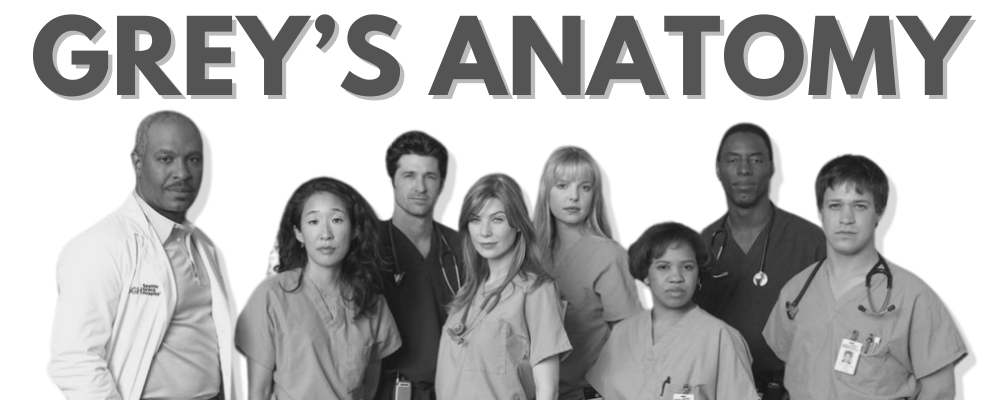
I arrive at the ER and three surgical interns have been assigned to my case even though there is no need for a surgeon. They are all furious that there is no need for surgery. Two of them are insistent that I’m just having a panic attack and want to call Psych, which they think is a fake specialty anyway, but the other has a fun idea that if they run enough tests on me, they can find a reason to do surgery on me. They are monsters who only see cadavers, not patients, and only want to slice and dice. More is said about how this is only a Psych case and doesn’t matter. (Every single intern on this show is evil.)
While they’re running tests on me, Meredith Grey gives a voiceover about the futility of life, and we see no fewer than six people have sex and at least one person commit adultery, but everyone is super hot so it’s totally OK that it’s happening.
A resident finds out that the interns are literally torturing me and rescues me from their horrors. They take on my case and find it puzzling and actually want to help me. They start running the correct tests, and figure out that I have POTS, but they deliver the diagnosis in a slightly inaccurate way that provides mild misinformation to the general public, similar to the way they did with their episode on Ehlers-Danlos Syndrome in which they implied that it’s so rare that a Chief of General Surgery would only have encountered one case in a 30-year-career. (Hint: some forms of EDS are incredibly rare, but EDS as a whole is not rare at all.)
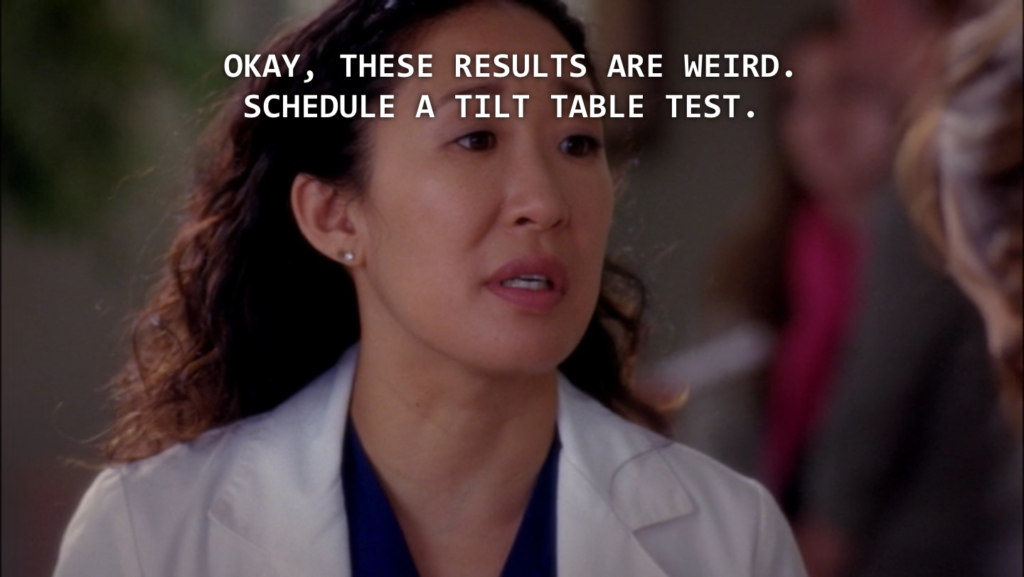
My visit wraps up with a montage of a super high level doctors who, in the real world, wouldn’t even blink an eye at me, telling me how to treat this condition while the perfect song plays in the background.
Dr. Grey does another voiceover, maybe this time it’s something super poetic where she pulls together something about life (again), the function of the autonomic nervous system, the hot people who had affairs earlier in the episode, literal physical pots, POTS the illness, all that good stuff. If anyone could do this speech, it would be a Shonda Rhimes character.
- Experience: 3/5, the original interns who work on me are incompetent and evil, but once you get past them and have some attendings and residents, the treatment is pretty good! Don’t you know this is a world class program, one of the top in the world? (Drink every time they say program.)
- Expertise: 4/5, it’d be a 5 if they didn’t over dramatize how rare some common things are.
- Extra Mile: 5/5, the music on this show is so good and while it’s a function of the show and now something that plays for the patient, I still consider it an Extra Mile Factor.
- Diagnosis: POTS! They did it. They figured it out.
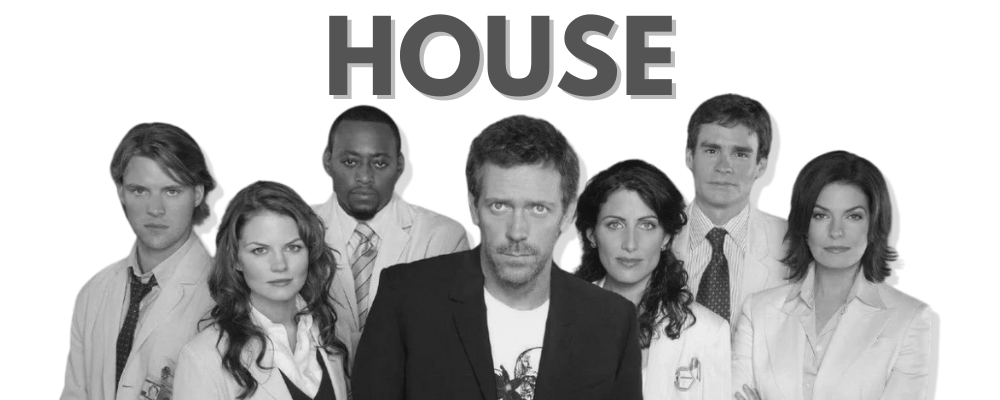
I go to the free clinic at Princeton-Plainsboro Teaching Hospital and for some reason my case is escalated quickly to Dr. Gregory House’s expert team of medical detectives. He and his lackeys begin running every single test in the book (I will never financially recover) and they begin throwing out very complex diagnostic hypotheses and mention lupus about five times, to which Dr. House answers, “it’s NOT lupus” in increasingly aggressive degrees of anger.
House goes off to flirt with Dr. Cuddy and bully Dr. Wilson while the trio o’ lackey docs are left to their own devices, probably suggesting something like showing up at my house and doing investigative work to determine whether or not I have the bubonic plague by digging through my trash. House walks around popping pills and being mean to people, and we eat that ish up.
After the most ridiculously unnecessary tests, House finally comes up with a brilliant monlogue on how and why I have dysautonomia with some very stunning visuals that play showing the inner workings of my body. We actually witness how my blood vessels don’t contract when I stand up, and what blood pooling looks like. It’s extremely cool.
House is nice to me for a very brief moment and it’s sincere, and I thank him, and then he’s mean again and walks off.
I am then left bankrupt.
- Experience: 0.5/5, my body feels ravaged after all of these tests have been run. Did I mention that I am bankrupt?
- Expertise: 3/5, House is incredibly smart, probably the smartest, but why was every test in the world run when all I needed was a tilt table test to figure out my POTS diagnosis? Remember how I’m bankrupt now?
- Extra Mile: 0/5, they went too far on the extra mile to the point that I am bankrupt, I showed up at the Free Clinic asking for help and now I have to sell all of my organs to buy food, because I’m bankrupt.
- Diagnosis: POTS. Yeah. They figured it out. After almost killing me and bankrupting me.

I am inexplicably seen by a gynecologist for my clearly cardiology/neurology problem. Rag tag, rough around the edges, but lovable Nurse Morgan Tookers makes incredibly invasive comments but ends up helping me find out that I have a meds interaction that’s causing some very serious side effects that are way worse than the benefits of the medications.

He and I end up laughing and then he shows me his dope stomach tattoo.
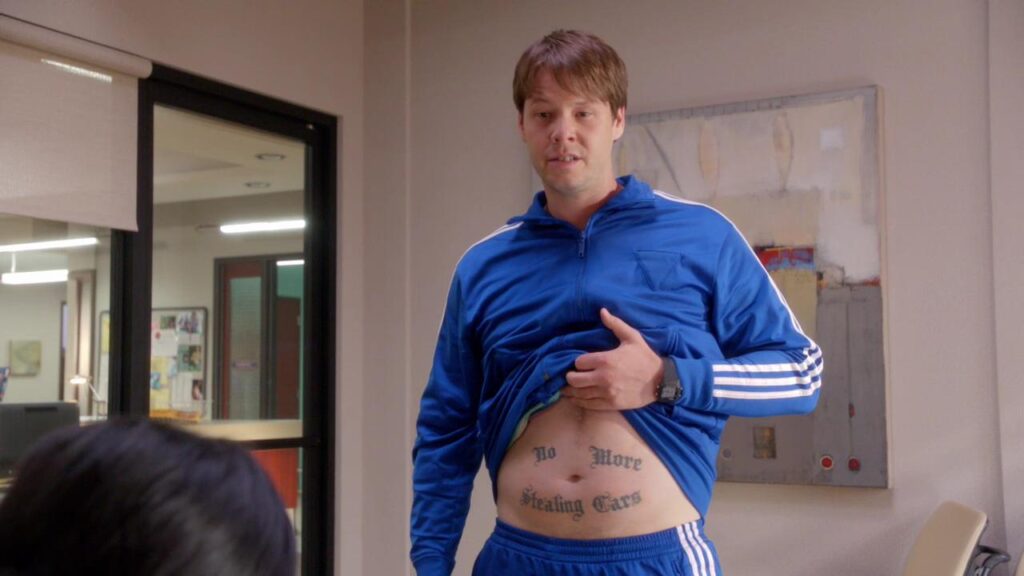
Because I’m at a gynecologist and I’m dizzy and throwing up for no clear reason, I’m given a pregnancy test and when it comes back negative, Dr. Danny Castellano gives me “Old School” treatment which consists of asking me over and over again if I’m sure.
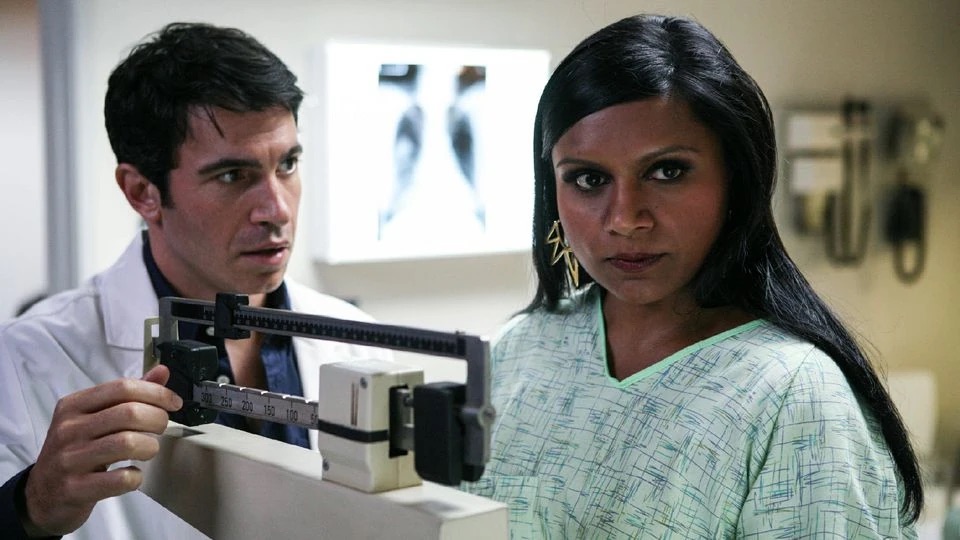
Danny goes to the back and gripes about his intolerable patient who won’t admit she’s pregnant and won’t subject herself to another pregnancy test. Dr. Mindy Lahiri reviews my chart and says in her tell-tale voice, “Danny, I think this woman has POTS!” Mindy of course has this hypothesis because POTS affects women by a ridiculous margin, and she is all about her women clients at their gynecological practice and her fertility clinic.
Dr. Lahiri comes to evaluate me and do a Poor Man’s Tilt Table and confirms it. She helps me set up an appointment with a cardiologist, and arranges for me to be her new patient and come in for my GYN check up.
Later, Danny and Mindy make out, but I don’t get to see it. Dang it.
- Experience: 4/5, for Nurse Morgan, the sexual chemistry, and the bright colors, but also Dr. Castellano was sort of a jerk despite being so hot
- Expertise: 5/5, for Mindy, and then Danny comes around and is like “wow, Mindy is really something” while he watches her do the Poor Man’s Tilt with me
- Extra Mile: 5/5, they helped me set up appointments!
- Diagnosis: POTS. Damn! They did everything here, despite it being a gynecologist’s office. It’s almost like any doctor can identify POTS if they listen to the patient, know what to look for, and use simple tools.
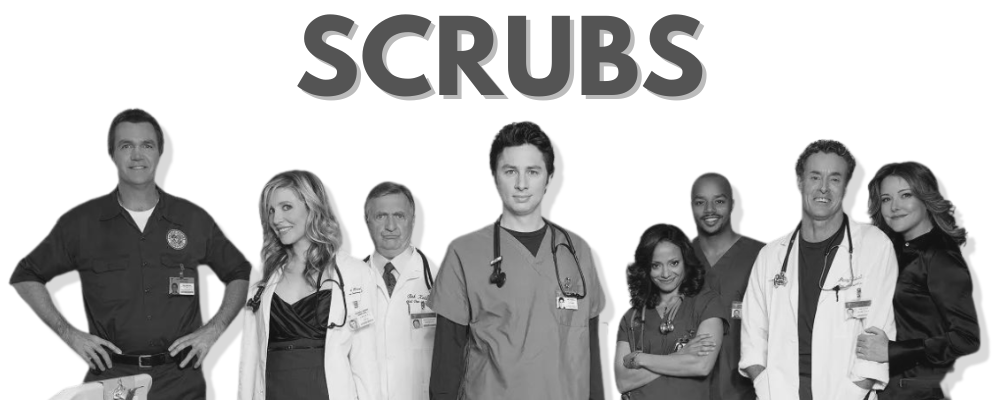
Much like Grey’s Anatomy, my visit to Sacred Heart will be filled with voiceovers. I arrive at the ER and am immediately treated to the highest standard of care by the phenomenal nursing staff (shout out to my girl Carla!) but am quickly introduced by the silly and charming Dr. JD Dorian who is convinced that I just have a hangover, maybe one or ten too many appletinis (JD’s drink of choice). JD grows concerned that maybe I have an alcohol problem, and the episode grows more serious.
I know you’ll say, “but Shannon, that’s the general premise of the episode Grey’s did on EDS” and yes, you’d be right, but the basis of this concept is built on the idea that JD would turn to Dr. Cox for guidance and Dr. Cox would get all huffy and puffy, say “newbie” a thousand times and give him a lecture-rant that ends with advice on being a good doctor.
Dr. Cox would end up diagnosing me with POTS and tell me everything’s going to be OK with a twinkle in his eye and walk off in a huff because he can’t show too much compassion, and then JD would reassure me that there’s hope ahead for me and say “we’re going to get you some help” in a very gentle voice and give me some pamphlets on patient support groups (like Dysautonomia International, obviously.)
Again, like Grey’s, fantastic music would play throughout my visit, but unlike any of the other shows, I’d see very silly hijinks such as JD and Turk dance around and act like boyfriends.
- Experience: 4/5, I’d get to watch the hilarious antics of JD and Turk during my visit and it would help me endure feeling like garbage
- Expertise: 4/5, they figured it out, didn’t they?
- Extra mile: 3/5, I love this show, but most of the extra mile is done with JD sucking up to Dr. Cox, and you know what, maybe that’s OK in the end.
- Diagnosis: POTS!
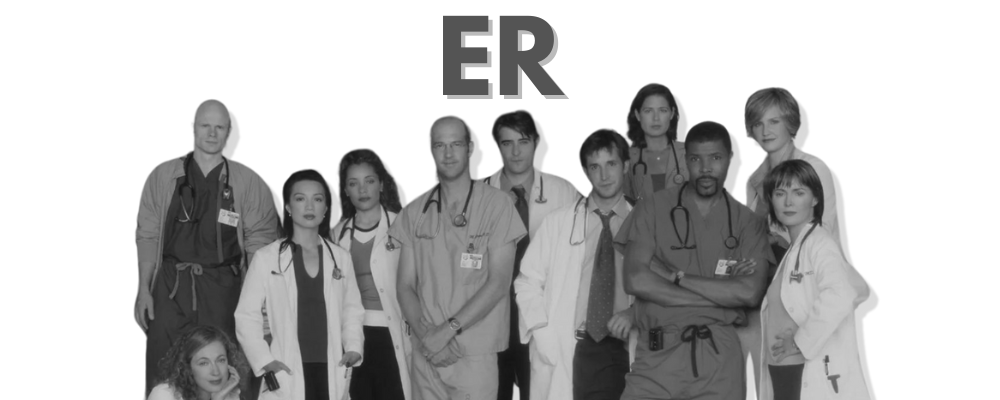
I arrive at Cook County General Hospital and wow is this hospital in a nebulous, non-specific but very central part of downtown Chicago!
I’m at a serious disadvantage in the world of ER. The show begins in 1994, a single year after postural orthostatic tachycardia syndrome was first published in 1993 (shout out to Dr. Philip Low.) The chances of any of the doctors on ER knowing about POTS is a million times lower than it is in any of the above fantasy hospitals, but still a trillion times higher than any average, real life doctors at the time.
The good news is, at Cook County General Hospital, they’re aware of dysautonomia and have tilt table tests they’re able to run.
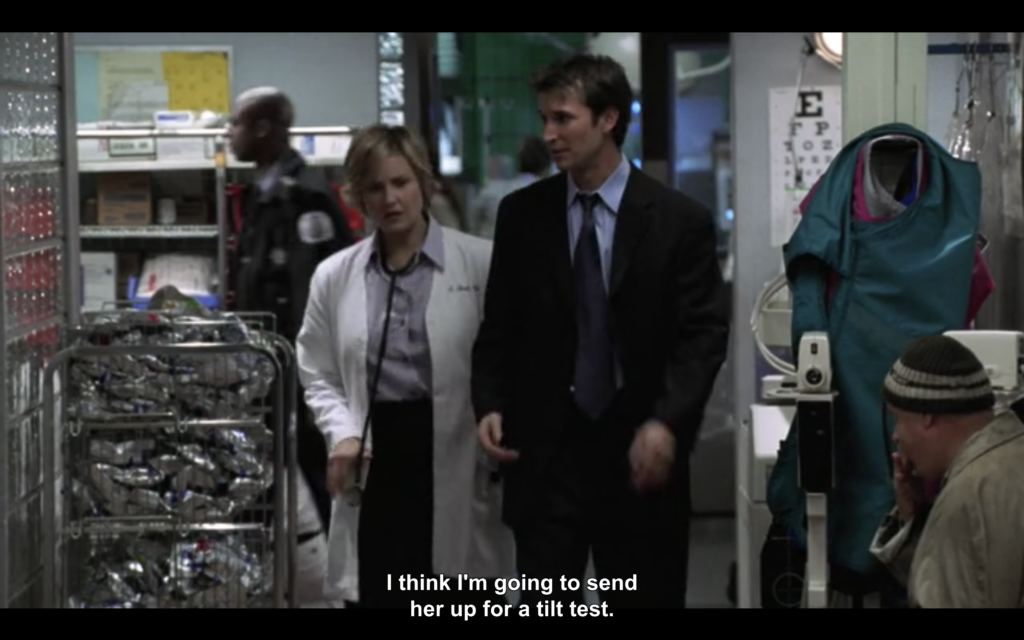
For the purpose of this thought experiment, I’m running two scenarios.
Scenario One – 1995/1996
I arrive in one of the earlier seasons, when Mark Greene is an attending, around 1995/1996. The doctors quickly evaluate me as a drunk or a drug addict, given that most of the ER patients they take in are either drunk, drug addicts, or both. I swear to them up, down, right, left that I’m not on drugs, and even more-so that I don’t want drugs, I just want help.
Dr. Greene hits the hospital library and reads up on different cases. He doesn’t end up finding anything, but he puts me on IV fluids and I feel so much better. They’re worried that I have some sort of disease so they set up an action plan and run tests on me, all coming back inconclusive. (“CBC chem 20!”)
Dr. Greene tells me to ask for him when my test results come in but I walk away without a diagnosis as there’s little to no medical research at the time. He’s an ER doctor, he’s already done more than he was expected to anyway, but that’s the spirit of the show–going above and beyond.
Scenario Two – 2008/2009
I arrive at the ER and am being treated by a much older, more haggard looking Dr. John Carter than we once knew at the beginning of the show. I’m presenting with those same symptoms, and he runs the same routine, of checking me for drugs.
All of my screens come back negative, and he’s puzzled. He asks me about exercise and de-conditioning. He recently read some research papers. He puts me in a room and goes to a computer–y’all, computers are a thing now!!!, they hardly were at the beginning of this show. He’s able to do some research and come back and order a tilt table test.
My test confirms POTS. He recommends that I go to a cardiologist but can’t give me a ton of advice beyond that, this is still new to him too. He gives me some IV fluids and when I’m done, wishes me luck, and tells me to ask for him next time I’m in the ER.
- Experience: 4/5, the doctors were kind and did their best.
- Expertise: 4/5, the doctors have outstanding knowledge for the time
- Extra Mile: 5/5, the research! Running tilt tables! All as ER doctors! My only complaint is that they set unrealistic expectations for what you’ll get at an Emergency Room–these doctors are doing anything for you even though they’re supposed to “treat you and street you.”
- Diagnosis: POTS, but in 2008/2009. The early 90s had so little information out there. This show was pretty wild, but not so wild to be able to diagnose an illness that was pretty much just given a name.
So, all of them figured it out, except for 1996 ER.
Is that cheating?
No, because the entire ethos of medical shows is that they figure out the illness, the story is how they figure it out. (And the friends we make along the way.)
So now I went over my favorite medical shows—which ones should I do next?

Wow – you nailed it 😊
thank you karen!! I did a LOT of research (tv watching) for this post 😉